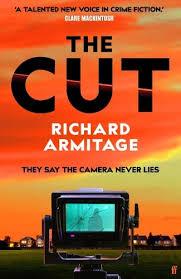
Guest Review of The Cut
14 Sept 2025
Another guest review for you all!
Review: The Cut by Richard Armitage
Thank you for the chance to share my latest read, which I received as personal bookmail! That is always an exciting moment in itself, by having read Richard Armitage's first book I was really looking forward to reading this! I am pleased to say that it didn't disappoint.
Richard Armitage’s The Cut is a novel that doesn’t rush to dazzle so much as it lingers, probing old hurts beneath new facades. It’s a story about how the past can bleed into the present, how childhood wounds never quite heal, and how the worst secrets are often kept by the people nearest to you. For all its suspense and the creep of horror beneath normality, its power lies in character, atmosphere, and moral ambiguity more than big shocks.
The novel is built on a dual timeline: one in the summer of 1994, when a tragic event, murder and betrayal, shook the small village of Barton Mallet; the other in the present day, where the convicted killer is about to be released, and a film crew arrives, setting in motion echoes of that trauma. I was talking to Tom about this and it resonated with him, as I undertand he's trying to write a dual timeline book at the moment and it sounds very difficult! Rather them than me!
What works very strongly is Armitage’s rendering of time, memory, and place. The world of 1994 is hot, loud and incredibly vivid. The present-day Barton Mallet, almost idyllic on the surface, carries shadows; the past corners every new scene. There’s a tension in the air that the reader can feel, not always in the form of immediate danger, but in the sense that something small could tip and unleash everything suppressed. Armitage uses setting and sensory detail well: weather, physical spaces, even the machinery of filmmaking to show how art can mirror trauma.
It's not perfect though! The pacing is at times a little uneven. The slow build is intentional and many readers will appreciate how the suspense grows, but there are stretches, especially in the first half, where the story drifts a little too much. Some dialogue and scenes feel more like setup than movement. For those used to thriller novels that barrel forward, this may feel a little frustrating.
Stylistically, Armitage’s experience in visual media comes through. The novel often feels cinematic: you can almost see the camera pans, the lights, the scenes being shot at night; you can sense how fiction or film recreations can both expose and distort truth. This choice is clever, and gives The Cut a meta-edge: art imitating life, life imitating art. The structure of flashbacks, switching perspectives, the creeping present danger serves that duality well. In the end, The Cut is very much worth reading if you like your thrillers with psychological depth, if you’re comfortable with tension that simmers rather than explodes, and if you’re intrigued by how trauma crosses decades. It certainly isn't flawless, but I would definitely recommend and it is certainly ambitious in its scope.
